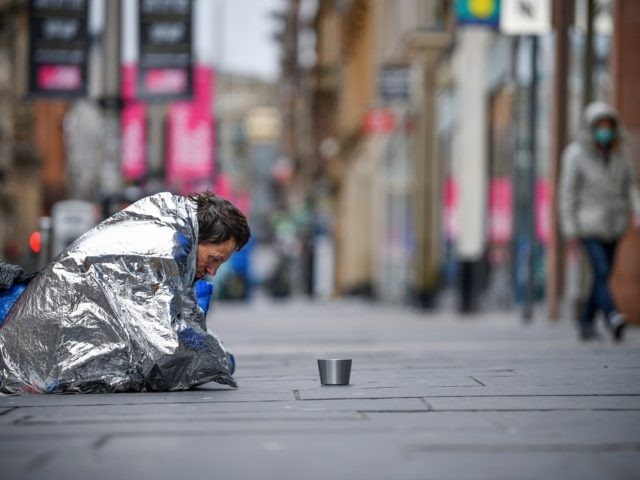The British government may need to increase taxes by over £40 billion per year in order to prevent the debt accrued during the China virus lockdowns from “spiralling upwards”, the Institute for Fiscal Studies (IFS) warned in a report.
The think tank’s report suggested that a decrease in tax revenue combined with record peacetime spending will force the government to either decrease spending — an unlikely proposition — or increase taxes, in a move that would fly in the face of the 2019 Conservative Party manifesto.
The IFS forecast that the deficit will reach £350 billion this year, representing 17 per cent of British GDP and more than six times initially projected in the March budget.
Tax Rises or Cuts? UK Government Faces Dilemma Over How to Pay for Coronavirus Spending https://t.co/p35LQ0nRE6
— Breitbart London (@BreitbartLondon) May 14, 2020
“Even a government content to keep debt constant at 100% of national income, and borrowing at around £80bn a year, would, under our central scenario, require a fiscal tightening (tax rise and/or spending cuts) worth around 2% of national income in 2024 — over £40bn in today’s terms,” the report said.
The report noted, however, that these figures are based on the current level of spending, meaning that if the government spends more to prop up industries hit by further lockdown, such as the hospitality sector, then taxes may need to be raised further.
IFS director Paul Johnson said that the money being spent to prop up the economy is necessary to prevent economic collapse. He said that as a result of low-interest rates, Chancellor of the Exchequer Rishi Sunak “shouldn’t worry unduly about the debt being accrued as a result. It is necessary.”
“Unfortunately, none of this will be enough fully to protect the economy into the medium run. Without action, debt — already at its highest level in more than half a century — would carry on rising,” he warned.
“Tax rises, and big ones, look all but inevitable, though likely not until the middle years of this decade,” Johnson added.
The report also found that the economic damage during the first half of 2020 caused by the China virus was ubiquitous, with GDP falling in the U.S. and Germany by 11.5 per cent and 14.3 per cent in the European Union as a whole. Yet the sharpest declines in major economies were seen in Spain and the United Kingdom which saw 22.7 and 22.1 per cent falls in GDP respectively.
Delingpole: Boris’s Chancellor Discovers the Magic Money Tree https://t.co/GhroelPBQd
— Breitbart London (@BreitbartLondon) March 11, 2020
The prospect of massive tax hikes comes as the unemployment rate in the United Kingdom reached its highest level in three years.
In the three months to August, the unemployment rate rose to 4.5 per cent compared to 4.1 in the previous quarter. During the same time, redundancies rose by a record 114,000, reaching the highest level since 2009 during the last economic crisis.
The Office for National Statistics said that an estimated 1.5 million people in the country were unemployed between June and August, while a further 2.7 million in September claiming employment-related benefits from the government, up by 1.5 million since the start of the lockdown in March.
So far, the Treasury has spent nearly £40 billion on the furlough scheme, which has subsidised the wages of some of the people who were impacted by the government’s decision to shut down the economy.
Last week, Rishi Sunak announced that he would be extending the scheme for an additional six months starting in November, covering 67 per cent of wages of up to £2,100 a month.
Pay the Bill: UK Eyes Big Tax Rises After Government Coronavirus Spending Spree https://t.co/piMj9dKBmK
— Breitbart London (@BreitbartLondon) September 1, 2020
The ONS’s deputy national statistician for economic statistics, Jonathan Athow, told the BBC that there had been a “sharp increase” in out-of-work people searching for jobs since March, with the hospitality, travel, and recruitment industries facing large numbers of redundancies.
“Overall employment is down about half a million since the pandemic began and there are particular groups who seem to be most affected, young people in particular,” he said.
“[Of those out of work] about 300,000 are aged 16-24, so about 60% of the fall in employment… that’s really disproportionate.”
Responding to the unemployment figures, Chancellor Rishi Sunak said: “I’ve been honest with people from the start that we would unfortunately not be able to save every job. But these aren’t just statistics, they are people’s lives.
“That’s why trying to protect as many jobs as possible and to helping those who lose their job back into employment, is my absolute priority.”
UK Economy Falls At Fastest Rate Since 2008 Crash, Massive Tax Rises Loom https://t.co/0jqGWrsz9O
— Breitbart London (@BreitbartLondon) May 13, 2020
Follow Kurt Zindulka on Twitter here: @KurtZindulka

COMMENTS
Please let us know if you're having issues with commenting.